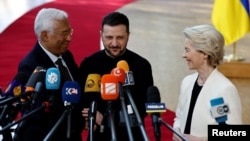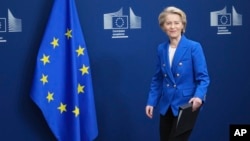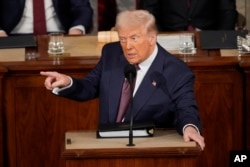After a successful summit in Brussels that saw Ukrainian President Volodymyr Zelenskyy receive strong backing from European leaders, Kyiv will now turn its attention to high-stakes talks next week between Ukrainian and US officials.
The Ukrainian president said in a social media post following the summit that he will travel to Saudi Arabia, which hosted the first round of talks between the United States and Russia, and that his team "will remain in Saudi Arabia to work with American partners." Zelenskyy will not attend the talks personally.
White House special envoy Steve Witkoff confirmed that a meeting is planned and said that he idea was to "get down the framework for a peace agreement." He said coordination efforts were still ongoing and that the meeting could take place in Riyadh or Jeddah.
"But I think the larger discussion for us…is to get a peace deal done," Witkoff told reporters.
Zelenskyy said the talks with the United States were evidence that Kyiv was working to reach a "fast and lasting" peace and he expressed hope that it will be "a meaningful meeting."
The development caps off a whirlwind week of diplomacy for Zelenskyy amid tensions with the United States and competing visions over how to end the three-year-old war.
One week ago on February 28, Zelenskyy and US President Donald Trump were involved in a public clash in the Oval Office where Trump accused the Ukrainian president of not being ready to end the war. Zelenskyy left the White House without signing a minerals deal and Washington proceeded to pause military aid to Ukraine and stop sharing intelligence.
"I think Ukraine wants to make a deal because they don’t have a choice," Trump told reporters in the Oval Office on March 6.
"I also think that Russia wants to make a deal because in a certain different way -- a different way that only I know -- they have no choice either," he added.
Trump also said he will also visit Saudi Arabia over the next month and a half, without elaborating further.
"I don’t know, I can’t tell you," he sid in response to question about whether he would travel to the country to meet Russian President Vladimir Putin. "I’m going to Saudi Arabia."
A 'Watershed' Meeting In Brussels
Now, Ukraine will be heading into the upcoming talks with fresh support from Europe.
With the exception of Hungary, European Union governments rallied behind Zelenskyy at a March 6 summit in Brussels. The Ukrianian president called on leaders at the meeting to push the Kremlin to halt air and sea attacks on Ukraine as a step toward building trust and moving forward in negotiations to end the war.
After crisis meetings in Paris and London, the summit focused on boosting defense spending in Europe after the United States suspended aid to Ukraine and signaled Europe must play a bigger role in its own security.
EU Commission President Ursula von der Leyen kicked off the meeting by warning that "Europe faces a clear and present danger," exacerbating the need for it "to be able to protect itself, to defend itself."
"This is a watershed moment for Europe and Ukraine as part of our European family," she added. "It's also a watershed moment for Ukraine."
After several hours of discussions, the European Council approved a statement saying Russia’s war of aggression against Ukraine and its repercussions for European and global security "constitute an existential challenge for the European Union."
"In this context, the European Union will accelerate the mobilization of the necessary instruments and financing in order to bolster the security of the European Union and the protection of our citizens," it added.
The document, which includes wording that gives members fiscal flexibility on defense spending and supports the idea of providing members with EU-backed loans of up to 150 billion euros ($160 billion) to spend on their militaries, was approved by all 27 EU members, including Hungary.
Earlier in the day, Budapest made it clear it wouldn't support a statement backing Ukraine, though Hungary was on board with bolstering spending on defense.
In his speech, Zelenskyy thanked those in attendance for their support more than three years after Russia launched its full-scale invasion of Ukraine, while urging them to ensure "that the Russians are not deceiving us" in any talks to "a full and fair settlement, to a comprehensive agreement on security guarantees and an end to the war," Europe's deadliest conflict since the end of World War II.
"The next step is basic trust to the circumstances in which the negotiations are taking place.... The release of prisoners can be a means of establishing basic trust," he said.
What's The Plan To REARM Europe?
Ahead of the meeting, von der Leyen called for the adoption of REARM Europe (her capitalization), which envisages releasing up to 800 billion euros for EU members states to spend on defense. The summit's draft conclusions, seen by RFE/RL, broadly welcome the plan, setting the stage for more detailed plans to be approved at the next European Council on March 20-21.
Noting the need to "substantially increase defense expenditure," the text calls for "action at the EU level" to boost military capabilities in the face of "threats posed by Russia and Belarus."
EU leaders are also set to welcome new lending rules outlined by the European Investment Bank, freeing up funds to finance projects such as barracks and military hospitals.
Ahead of the summit, there was a broadly warm response to von der Leyen's letter.
German Foreign Minister Annalena Baerbock said it was an "important first step" while Greek Prime Minister Kyriakos Mitsotakis posted on social media: "We must now work out the details."
This reflects the fact that, despite the upbeat rhetoric of European officials, much of the details still remain to be put in place and there are questions about whether the overall price tag is realistic.
Critics have argued that the EU is not making new money available but merely rearranging existing budget elements.
Can Europe Defend Itself Without US Help?
The plan comes as Washington announced a pause on its military assistance to Ukraine, and some have framed it as Europe preparing for a worst-case scenario without a US security umbrella.
Mostly, European politicians have rejected this.
"We should not give up on the US," said Czech Foreign Minister Jan Lipavsky on March 4, while British Prime Minister Keir Starmer told reporters at the weekend London conference: "I do not accept that the US is an unreliable ally."
But the fact that they're saying such things at all is a sign of how rattled Europe is by decisions and statements being made in Washington.
Can Zelenskyy Repair Relations With Trump?
"The situation in Ukraine, given notably the position of the new US administration, has changed," a senior EU official told RFE/RL. "This is the starting point for the special European Council."
European leaders will address what they can do to fill the gap left by the aid freeze to support Ukraine's armed forces. But the summit is not expected to provide significant new announcements on this.
The main focus remains repairing the rift between US President Donald Trump and Zelenskyy, and there was some movement on this in the days before the summit.
In his address to Congress on March 4, Trump said Zelenskyy had written to him following their recent Oval Office showdown, and that the Ukrainian leader was ready to return to the negotiating table.
The next day, his national-security adviser, Mike Waltz, told Fox News that the pause on military aid could be lifted if Ukraine signed a deal giving Washington access to its mineral wealth -- which another US official said was still possible after Zelenskyy expressed regret for the White House clash.
Going into the Brussels meeting, German chancellor Olaf Scholz noted that "Ukraine's security arrangements and peace cannot be forcefully imposed by outside actors.
"We are aligned with that concept. The strengthening of Ukraine's security strength is why we are here to discuss today," Scholz said.
The question of Ukraine may also expose the lack of EU unity at the special summit.
After making a TV address to the nation on March 5, Macron had dinner with Hungarian Prime Minister Viktor Orban at the Elysee Palace on the eve of the summit.
His aim was to try to get Orban, who has nurtured close ties with Russian President Vladimir Putin, on board with a statement supporting Ukraine.
Hungary's nationalist leader, a Trump ally, has signaled he may veto a unanimous statement backing Ukraine, though he has also made clear he would support measures for an increase in spending on Europe's own defense.
In televised remarks, French President Emmanuel Macron said it would be "madness" to ignore the threat Russia has become for Europe and said he is open to discussing the extension of France's nuclear deterrence to Paris's allies on the Continent.
Who Could Send Troops To Ukraine?
The meeting in Brussels follows a string of previous crisis gatherings, most recently in London on March 2.
A key takeaway from that meeting was that Britain, France, and other countries would work on a joint peace plan with Ukraine, which they would then take to Washington. There may be some discussion of this on the sidelines in Brussels, but post-Brexit, this is something that is being developed away from EU meetings.
Another key point from recent talks is the plan to form a European military force to deploy to Ukraine as part of a cease-fire or peace deal.
So far, Britain and France have said they're ready to put boots on the ground. Starmer said in London that other countries had also stepped up but declined to name them.
The senior EU official confirmed that member states had expressed willingness but "to go into details is premature." However, he added, "work needs to start and this European Council is a good moment for that work to start."

















